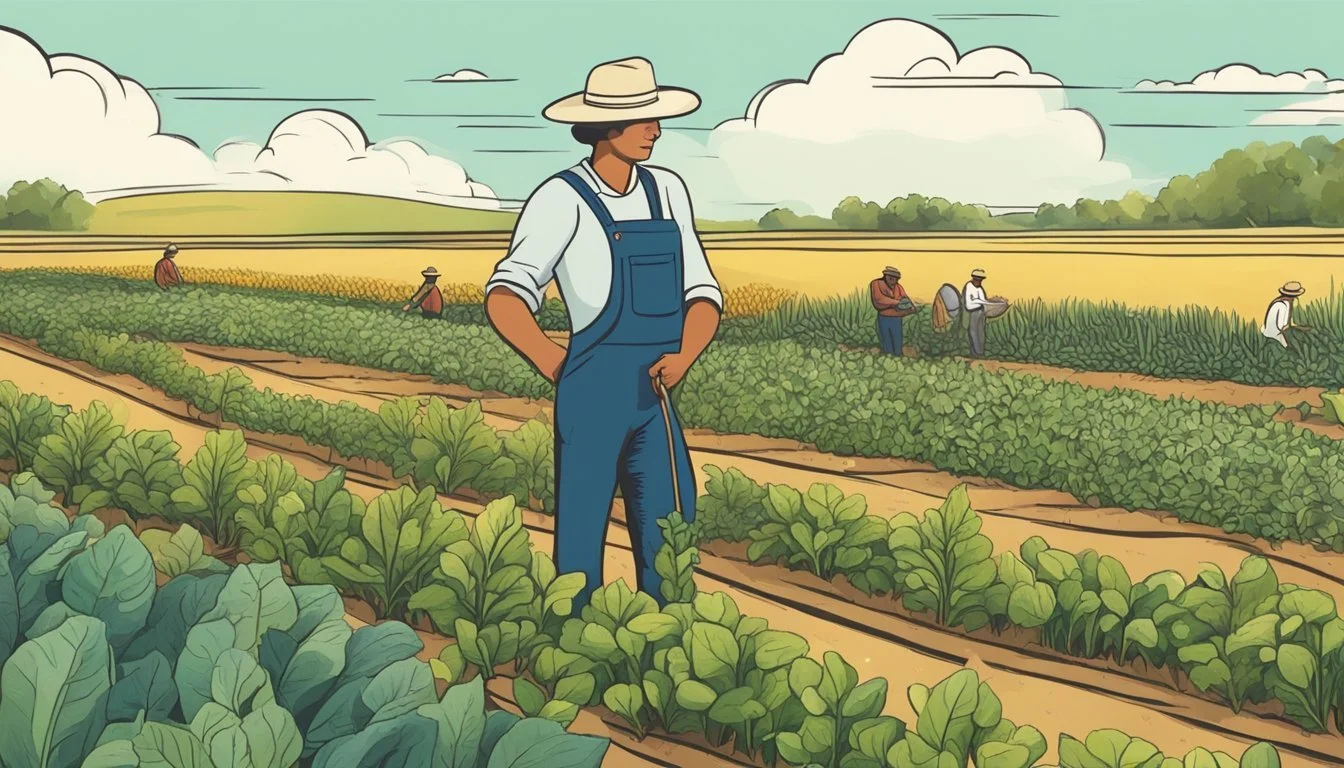The Carnivore Diet for Urban Farmers
Balancing Meat Consumption with Eco-Conscious Farming
Urban farming represents a proactive approach to food sustainability within city environments, offering a hyper-local solution to the fresh produce needs of urban populations. However, the integration of the carnivore diet—that is, a dietary regime focused exclusively on animal products—into this sustainable practice presents both unique challenges and opportunities for urban farmers. With a rising interest in diet's impact on personal health and environmental sustainability, urban farmers who follow or cater to the carnivore diet must weigh their choices carefully against the broader context of food system impacts.
The carnivore diet, which excludes plant-based foods in favor of meat, fish, and other animal products, can have varying implications on local and global food sustainability. When adopted by urban farmers, this dietary practice necessitates a critical analysis of sourcing, waste management, and resource allocation. Urban farmers have the potential to influence sustainability in a way that differs from rural counterparts due to the proximity to consumers and the particular challenges of urban agriculture, such as limited space and the need for innovative farming techniques.
Aligning the carnivore diet with sustainable practices requires urban farmers to adopt a multi-actor approach, engaging with suppliers, consumers, and policymakers. Urban farming strategies can be tailored to include environmentally responsible carnivorous practices while ensuring access to nutritious and ethically sourced animal products. This involves not just the assessment of the environmental impact of meat production, but also the adoption of practices that contribute to a reduced carbon footprint and less resource-intensive operations. By doing so, urban farmers can help democratize food policies and promote a model of food production that supports both dietary preferences and sustainable living in urban settings.
Understanding the Carnivore Diet
The Carnivore Diet emphasizes consuming animal products exclusively and eschews plant-derived foods. This section examines its historical roots, core principles, and how it contrasts with other low-carb diets.
Historical Context and Evolution
The Carnivore Diet is believed to echo the dietary patterns of our paleolithic ancestors. Historical evidence suggests that early humans had diets predominately comprised of meat due to hunting practices, with plant consumption being more opportunistic. Over time, as agriculture developed, plant-based foods became a larger part of the human diet. The modern resurgence of the Carnivore Diet is often seen as a return to these ancient eating habits, though it is framed around current health narratives and lifestyle choices.
Principles of the Carnivore Diet
At the heart of the Carnivore Diet is the consumption of animal proteins and fats while eliminating carbohydrates. A typical dietary intake includes:
Meats: Steak, poultry, and red meat are staples.
Organ Meats and Bone Marrow: Highly nutritious parts of the animal are emphasized.
Fish and Shellfish: Included for their omega-3 fatty acids.
Dairy: Often allowed, but some prefer to exclude it to maintain a zero-carb intake.
Proponents suggest that the diet can lead to various health benefits due to its high-protein nature; however, it’s essential to consider individual reactions and consult with a health professional before adopting such a regimented dietary plan.
Comparison with Other Diets
When contrasted with other low-carb diets, such as the ketogenic, or keto, diet, the Carnivore Diet takes the reduction of carbs to the extreme by aiming for zero-carb intake. Here's how they differ in terms of carbohydrate allowance and food variety:
Dietary Regimens and Their Characteristics
Carnivore
Carbohydrate Allowance: Zero carbs
Food Variety: Exclusively animal products
Keto
Carbohydrate Allowance: Low carbs (usually 5-10% of calories)
Food Variety: Animal products, low-carb vegetables, some dairy
While both diets are low in carbs and high in animal proteins, the keto diet allows for more diversity, including certain plant-based foods that are low in carbohydrates. The Carnivore Diet represents the most restrictive form, with a focus solely on animal-derived foods.
Health Implications
This section examines the health-related aspects of the carnivore diet, focusing on its potential benefits and disadvantages from a nutritional standpoint, and how it may impact long-term health outcomes for urban farmers.
Benefits and Advantages
The carnivore diet, which consists exclusively of animal products, is reported to offer certain health benefits. Those who support the diet claim improvements in weight loss and reduced inflammation, which can have positive effects on conditions such as obesity and type 2 diabetes. The diet may simplify blood sugar regulation due to its low carbohydrate content. Moreover, proponents suggest that it can lead to improved mental clarity and has been associated with increased testosterone levels in some cases. The absence of plant-based foods means it's a naturally low-ldl, ketogenic diet which could be beneficial for the immune system.
Weight Loss: High in protein and fat, leading to satiety and potential reduction in calorie intake.
Inflammation: Animal fats contain omega-3 fatty acids that may lower body inflammation.
Blood Sugar: Minimal carbohydrates can stabilize blood sugar levels.
Mental Clarity: Ketones produced on the diet might enhance brain function.
Testosterone: Some evidence suggests an increase in hormone levels due to higher fat intake.
Potential Risks and Considerations
Despite its potential health benefits, the carnivore diet is also associated with several health risks. As an extremely restrictive diet, it could lead to nutrient deficiencies, particularly of vitamin C and some B vitamins found primarily in plants. The diet is high in saturated fat and cholesterol, which might negatively impact heart disease risk. There's an increased likelihood of constipation due to lack of fiber. Furthermore, the long-term impact of eschewing a diverse gut microbiome is not well understood, but could include adverse effects on the immune system and overall digestion.
Nutrient Deficiencies: Limited intake of certain vitamins and minerals.
Heart Disease: Possible increased risk due to high saturated fat.
Digestive Health: Lack of fiber can lead to gastrointestinal issues like constipation.
Chronic Disease: Potential for increased risk if diet is unbalanced.
Long-Term Effects
The long-term effects of the carnivore diet are not yet fully understood due to the lack of extensive research. Early evidence from populations such as Arctic indigenous groups suggests that a meat-centric diet can be sustained over long periods; however, these populations typically engage in much higher levels of physical activity and live in very different environments than urban farmers. Concerns regarding the risk of chronic diseases, high blood pressure, and cancer linked to high consumption of red and processed meat remain unresolved in scientific literature. It is also unclear how the cessation of a varied diet will affect the body's ability to combat illness over time.
Chronic Disease: Exploring the connection between long-term meat consumption and disease prevalence.
Cancer: Investigations into associations with increased meat intake, especially processed meats.
Heart Health: Monitoring impacts on blood pressure and cardiovascular risk factors over time.
Moving forward, further empirical studies are needed to provide a comprehensive understanding of the long-term health implications associated with the carnivore diet.
Dietary Components and Nutrition
In assessing the Carnivore Diet, its focus rests heavily on animal products such as meat, eggs, and, to a lesser extent, dairy, with a complete abstention from grains, nuts, and vegetables. This approach to nutrition raises questions about protein sources, the absence of certain food groups, and ensuring adequate nutrient intake.
Focusing on Protein Sources
The Carnivore Diet elevates the consumption of protein-rich foods to the forefront of daily intake. Meats, including beef, pork, and chicken, and organ meats like liver, are staples within this dietary framework. These are accompanied by eggs and fish, adding variety and essential fatty acids. One should note that different meats offer varying nutrient profiles, for instance, liver is particularly high in vitamin A.
Beef: Ribeye steaks, hamburger patties
Poultry: Chicken breasts (What wine goes well with chicken breast?)
Fish: Wild salmon, crab (how long does crab last?)
Eggs: Scrambled, fried
Organ Meats: Liver, which can be made into dishes such as organ meat pie
Dairy Foods: Butter, cheese
Exclusion of Certain Food Groups
The Carnivore Diet is characterized by its exclusion of commonly consumed food groups, including vegetables, grains, fiber-rich foods, nuts, and carbohydrates in general. This results in an absence of polyphenols, antioxidants, and potentially vitamin C, all of which are primarily found in plant-based foods. Proponents must consider how they will address these absent nutrients to maintain health.
Nutrient Intake and Supplementation
To counterbalance the lack of certain micronutrients and fiber typically derived from fruits, vegetables, and grains, individuals may need to tailor their carnivorous diet with supplementation or careful food selection. Critical components at risk of being under-consumed include but are not limited to, vitamin C, certain B vitamins, and antioxidants. Regular monitoring of micronutrient intake and potential supplementation should be contemplated to avoid deficiencies.
Micronutrients at risk: Vitamin C, certain B vitamins
Supplementation: May be considered, especially if diversity in meat consumption is low
Fats: Obtained from meats and dairy, like butter and cheese
Sodium: Can be high due to the nature of preserved meats; should be monitored
In a diet almost exclusively made of animal products, fats become a primary energy source. It's important to monitor the types of fat consumed and their proportion. Concerns about a high-fat intake, notably saturated fat, and its correlation with health conditions, like colon cancer, should also be taken into account.
I highly recommend purchasing fiber supplement, vitamin C, vitamin B online for a convenient shopping experience!
Sustainability and Environmental Concerns
Urban farmers adopting a carnivore diet need to carefully consider the sustainability and environmental impact of meat production. This section examines how meat production can align with sustainable practices, the benefits of urban farming and locally sourced meat, and considers alternative perspectives.
Evaluating Meat Production
The environmental impact of meat production varies significantly based on methods and practices. Pasture-raised livestock systems can offer more sustainable alternatives to conventional feedlots by potentially reducing greenhouse gas emissions and improving soil health. However, the feasibility of scaling such practices in urban settings is limited. Urban farmers must evaluate:
Resource Efficiency: How efficiently animals convert feed into meat, using less water and feed per pound of meat produced.
Ecosystem Impact: The effect of meat production on local ecosystems, considering factors such as biodiversity conservation and soil quality.
Urban Farming and Locally Sourced Meat
Local sourcing of meat through urban farming practices can reduce food miles and provide fresher options for urban carnivores. Here are the essential considerations for urban farmers:
Short Supply Chains: Locally sourced meat typically involves shorter supply chains, which can minimize transportation emissions and support local economies.
Community Engagement: Urban farming encourages community involvement, which can lead to a greater awareness of sustainable practices and local food systems.
Alternative Perspectives
While urban carnivores may focus on meat, incorporating plant-based foods like vegetables, fruits, seeds, legumes, and whole grains can enhance sustainability. These foods require less energy to produce than meat and can be grown alongside animals in urban settings. Critical points include:
Nutritional Balance: Diets rich in plant foods provide essential phytonutrients and can reduce the reliance on processed meats, which have a higher environmental footprint.
Dietary Diversity: Embracing a balance of animal and plant-based foods can lead to more environmentally sound and sustainable practices.
Practical Aspects and Daily Implementation
The Carnivore Diet requires strategic planning and consideration of economic and lifestyle factors to align with the principles of urban farming and sustainable practices. This section provides insights into meal planning, cost management, and adjustments necessary for urban farmers following this restrictive dietary pattern.
Meal Planning and Preparation
Meal Planning: Urban farmers on the Carnivore Diet should prioritize meal plans that feature a variety of animal proteins. A typical week might include:
Monday: Breakfast of scrambled eggs with side bacon, lunch with chicken breasts topped with low-lactose cheese, and dinner featuring organ meats such as liver, which is nutrient-dense.
Wednesday: Ham steak for breakfast, a lunch of turkey burgers (no bun), and a dinner of bone broth, which can be easily integrated with urban farming practices.
Preparation: Simplify cooking by using methods such as slow-cooking or grilling. Preparing in bulk can save time and ensure consistent calorie intake.
If you're looking for slow cooker or electric grill, buying it online is your best bet!
Economic Considerations
Purchasing large cuts of meat or direct from local farmers can reduce costs. Expense tracking is vital, as a Carnivore Diet can be more costly than other diets like the Paleo Diet due to the high consumption of meat.
Economic Tips:
Buy in bulk from local butchers or farms.
Take advantage of sales and freezer storage.
Consider nose-to-tail eating to utilize the whole animal.
Lifestyle Compatibility
Maintaining a Carnivore Diet could challenge urban farmers who also grow plant-based foods. It necessitates a shift towards animal husbandry or establishing relationships with local meat producers. This diet also benefits from the inclusion of low-lactose dairy products and possible supplements to ensure nutritional completeness.
Start the day with a protein-rich breakfast, for example, eggs and bacon.
Incorporate portable options like jerky for convenience.
End the day with a satisfying meal that may include a hearty meat portion, ensuring adequate calories and nutrient intake.
Psychological and Social Considerations
When adopting the carnivore diet, urban farmers must weigh psychological and social factors that could influence their well-being and interpersonal relationships. This section addresses the cultural and social impact of this dietary choice as well as what motivates individuals to adhere to such a regimen, in spite of potential societal pressures.
Cultural and Social Impact
The carnivore diet alters not just what one eats, but also intertwines with the fabric of social customs and expectations. Urban farmers may encounter difficulties aligning their diets with traditional culinary practices, which often emphasize a more varied plant and animal-based diet. Social dynamics shift as they may have to forgo culturally significant dishes that are not carnivore-friendly, potentially impacting relationships and participation in communal events.
Adherence to this diet can lead to complications during social engagements such as dining out, where menu options may be limited. They often have to communicate their dietary restrictions, which can lead to misunderstandings or the perception of being high-maintenance. However, with the rise of diet-specific social media groups, individuals find support and camaraderie, which can mitigate feelings of isolation and help maintain mental health.
Adherence and Motivation
Adhering to the carnivore diet requires substantial motivation due to its restrictive nature. Many who choose this lifestyle do so for health reasons, seeking improvements in conditions such as obesity, arthritis, or general health issues. Reports indicate that some individuals experience positive changes in their physical health, which reinforces their commitment to the diet.
Mental health aspects, including the management of depression, also play a role in one’s dedication to the diet. The influence of social media is twofold; it provides a platform for sharing success stories and a space for peer support. These online communities often serve as a supportive network, offering encouragement and practical tips to maintain the diet, thus helping individuals stay motivated amidst challenges.
Community and Movement
In examining the dynamics surrounding the Carnivore Diet within urban farming circles, two key elements stand out: the individuals leading the movement and the growth of its supportive community.
Prominent Advocates
Dr. Shawn Baker, an orthopedic surgeon, stands out as a notable proponent of the Carnivore Diet. His vocal support for the diet's health benefits has been amplified across social media platforms. Jordan Peterson, a clinical psychologist, also attributes his improved health to a Carnivore Diet, further adding credibility and public interest in the movement.
Growth of the Carnivore Diet Community
The Carnivore Diet community has seen exponential growth, primarily through social media channels. These digital spaces facilitate discussions, sharing success stories, and providing support. This community often draws parallels with the Paleo Diet, which emphasizes the consumption of whole and unprocessed foods akin to what might have been eaten during the Paleolithic era. The sense of returning to a 'traditional' way of eating resonates with the urban farming community's ethos of sustainability and natural living.
Criticism and Controversy
The Carnivore Diet comes under scrutiny for its potential health impacts and opposing viewpoints from various diet philosophies.
Medical and Nutritional Skepticism
Medical professionals and nutrition experts often raise concerns about the long-term effects of the Carnivore Diet on health. Heart disease and cancer, particularly colon cancer, are frequently mentioned due to the diet's high intake of red and processed meats. Critics argue that the absence of plant-based foods can lead to deficiencies in fiber, vitamins, and minerals, thereby possibly increasing the risk of health issues.
Risk Factors:
Heart disease: Elevated levels of saturated fat and cholesterol from excessive animal product consumption.
Cancer: Certain studies link a high intake of red and processed meats with increased cancer risk.
Obesity: Without careful portion control, the high caloric density of meat can contribute to weight gain.
Nutritional deficiencies: Potential scarcity of necessary nutrients typically found in a varied diet.
Counterarguments from Vegetarian and Vegan Perspectives
The vegetarian and vegan communities offer a stark contrast to the Carnivore Diet, emphasizing the benefits of plant-based eating for health and the environment. They highlight the ethical implications of consuming animal products and underscore the environmental sustainability of plant-based diets. From a health standpoint, vegetarians and vegans argue that their diets are lower in fat and higher in dietary fiber, which can aid in the prevention of obesity.
Ethical Concerns:
Animal welfare: Prioritizing the humane treatment of animals.
Sustainability: Focusing on the lower environmental impact of growing plants compared to raising livestock.
From both medical and ethical perspectives, these criticisms form a core part of the debate surrounding the Carnivore Diet and its alignment with urban farming and sustainability.













